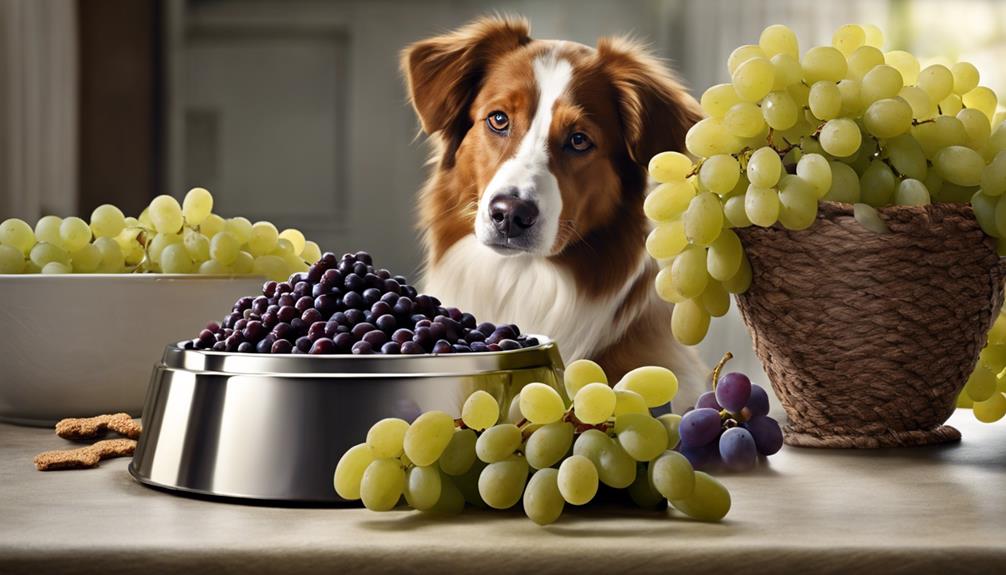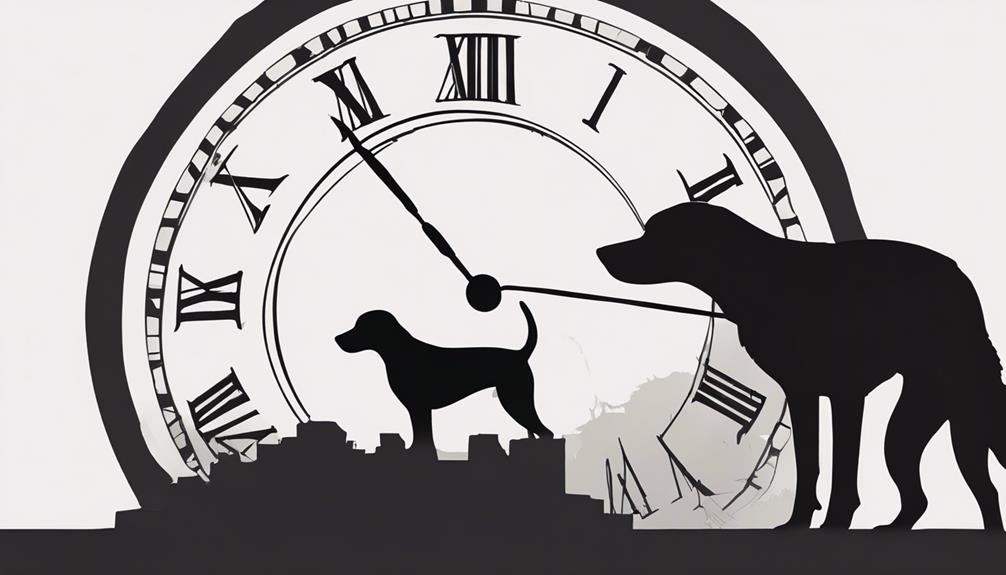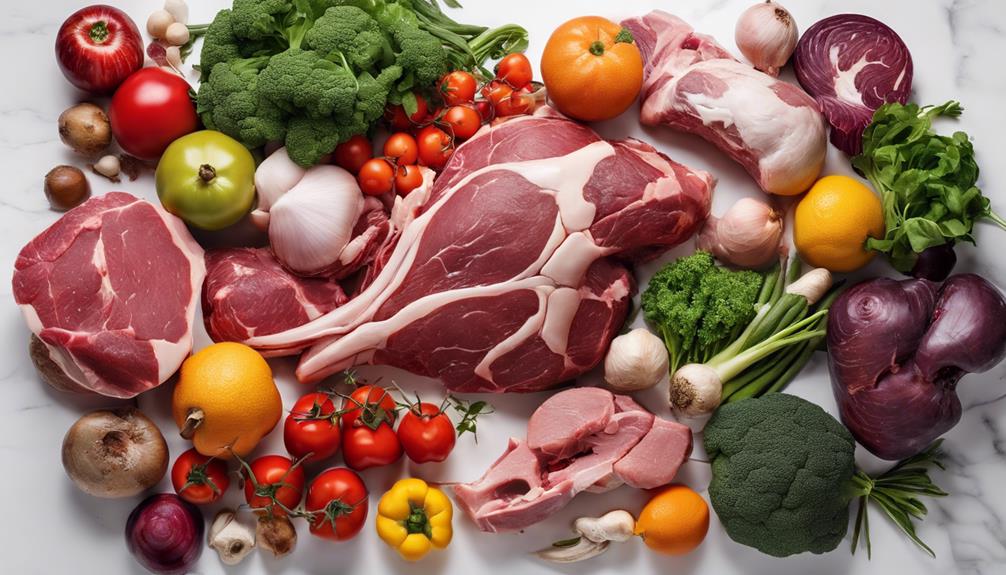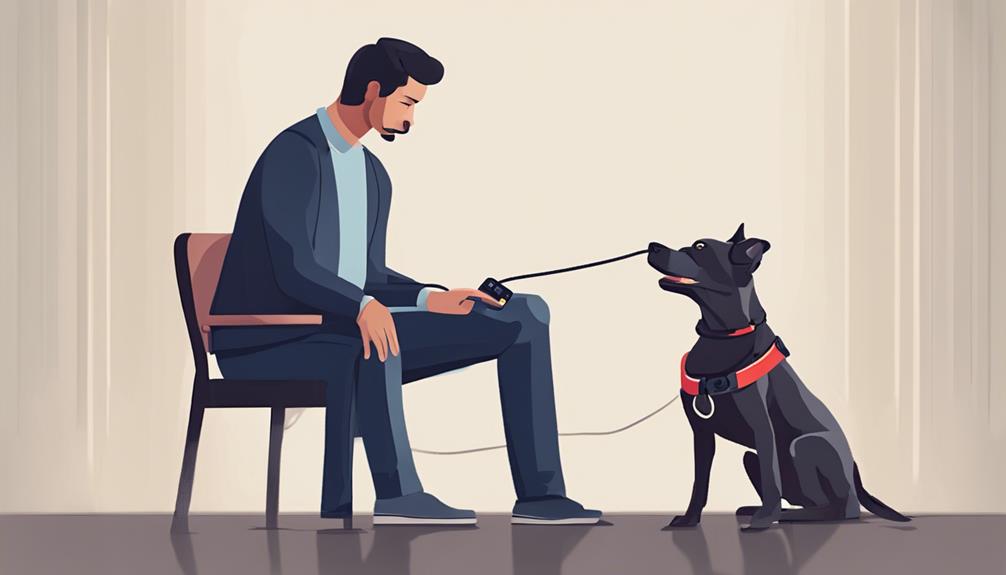Grapes are not safe for dogs. They can be highly toxic, even in tiny amounts, leading to kidney failure. The exact harmful part in grapes for dogs is still a mystery. Signs of grape toxicity to watch for include vomiting, diarrhea, and lethargy. Quick vet help is vital to prevent kidney damage. Avoid grapes and try safer fruits like blueberries and apples, which are healthy and low-risk. Understanding pet nutrition is key to keeping dogs healthy. Stay informed about what's essential for your furry friend's diet to guarantee their well-being. Learn more about pet nutrition and healthy snacks for dogs.
Key Takeaways
- Grapes are toxic to dogs, causing kidney failure.
- Symptoms of grape toxicity include vomiting and lethargy.
- Immediate veterinary attention is crucial after grape ingestion.
- Safer fruit alternatives for dogs include blueberries and apples.
- Pet nutrition awareness is essential for canine well-being.
Potential Risks of Feeding Grapes to Dogs
When considering the potential risks of feeding grapes to dogs, it's important to recognize their toxicity and the serious harm they can cause. Grapes and raisins are highly toxic to dogs, posing a significant risk of kidney failure even in small amounts. The exact toxic component in grapes that affects dogs isn't yet known, making it vital to err on the side of caution.
If a dog ingests grapes, it can lead to symptoms like vomiting, diarrhea, lethargy, and abdominal tenderness, indicating grape toxicity. Immediate veterinary attention is essential to prevent kidney damage and guarantee the well-being of the dog.
To safeguard your furry companion, it's best to completely avoid feeding them grapes or raisins. Remember, the health of our canine friends is precious, and steering clear of these toxic fruits can help keep them safe and healthy.
Signs of Grape Toxicity in Dogs

To understand the seriousness of grape toxicity in dogs, it's important to recognize the specific signs that indicate potential harm after ingestion. If your dog has consumed grapes, watch out for symptoms like vomiting and diarrhea. These are common indicators of grape poisoning in dogs.
Additionally, be on the lookout for signs such as decreased appetite and lethargy. If your furry friend seems unusually tired or shows a lack of interest in food after eating grapes, it could be a cause for concern. Increased thirst and changes in urination patterns may also signal grape toxicity. Abdominal tenderness and weakness are other symptoms to be aware of.
Immediate Actions After Grape Ingestion

If a dog consumes grapes, immediate veterinary attention is vital to prevent potential kidney failure.
Inducing vomiting at home may be recommended by a vet in some cases of grape ingestion. However, it's essential to avoid inducing vomiting if the dog struggles to breathe or shows signs of shock.
Veterinary care for grape poisoning may involve stomach cleaning, activated charcoal administration, and fluid therapy. Timely intervention is key to preventing severe complications from grape toxicity in dogs.
Remember, grapes are toxic to dogs, so if your furry friend ingests them, call your veterinarian immediately. Taking quick action can make a significant difference in your dog's recovery.
Be proactive and seek professional help as soon as possible to guarantee the best possible outcome for your beloved pet.
Treatment Options for Grape Poisoning

When a dog ingests grapes, it's essential to recognize the symptoms of grape toxicity promptly.
Seeking emergency veterinary care is vital to prevent potential long-term effects of grape poisoning.
Monitoring for kidney issues and ensuring proper treatment can help minimize the risks associated with grape ingestion.
Symptoms of Grape Toxicity
Identifying symptoms of grape toxicity in dogs is essential for timely treatment and successful recovery. When dealing with grape poisoning, keep an eye out for the following signs:
- Vomiting
- Diarrhea
- Lethargy
- Abdominal tenderness
Recognizing these symptoms promptly can make a significant difference in your dog's health. If you notice any of these signs after your dog has ingested grapes, seeking immediate veterinary care is vital.
Treatment options for grape poisoning may involve inducing vomiting, providing aggressive fluid therapy, and closely monitoring for kidney damage. Remember, acting quickly and decisively can greatly improve the chances of a positive outcome for your furry friend.
Emergency Veterinary Care
Recognizing the importance of addressing grape poisoning in dogs, emergency veterinary care offers vital treatment options to combat this potentially harmful ingestion. When a dog ingests grapes, immediate action is necessary to prevent serious complications such as kidney failure. Treatment may involve inducing vomiting to remove the grapes from the stomach and administering activated charcoal to absorb any toxins. In severe cases, veterinarians may perform stomach cleaning procedures to make sure no grape residue remains. Additionally, intravenous fluids are often needed to support kidney function and prevent dehydration. Remember, swift veterinary attention is key in managing grape poisoning and safeguarding your dog's health.
| Treatment Options | Description |
|---|---|
| Inducing Vomiting | Helps remove grapes from the stomach quickly. |
| Stomach Cleaning Procedures | Eliminates any remaining grape residue in severe cases. |
| Activated Charcoal | Administered to absorb toxins from the grapes in the system. |
| Intravenous Fluids | Supports kidney function and prevents dehydration. |
Potential Long-Term Effects
Understanding the potential long-term effects of grape poisoning in dogs is important for implementing effective treatment options. Long-term effects may include irreversible kidney damage, necessitating vital fluid therapy to support kidney function.
In severe cases, dogs may require hospitalization and intensive care to manage grape toxicity properly. Regular blood tests are essential for monitoring kidney function in dogs affected by grape poisoning.
Timely and appropriate treatment, such as vital fluid therapy and close monitoring, can greatly improve the prognosis for dogs with grape poisoning. Remember, quick action and close observation are key in addressing grape toxicity in dogs to prevent long-term complications.
Safer Alternatives to Grapes for Dogs

When considering safe options for dogs as an alternative to grapes, blueberries, strawberries, and apples stand out as healthy choices. These fruits are not only safe but also provide essential vitamins and antioxidants for our furry friends. Blueberries are excellent for dogs as they can improve cognitive function and are low in calories, making them a great snack option. Apples, on the other hand, are high in fiber and can promote good dental health in dogs. By offering a variety of fruits in moderation, we can treat our dogs to tasty and nutritious snacks without the risks associated with grapes.
| Fruit | Benefits | Notes |
|---|---|---|
| Blueberries | Improve cognitive function, low-calorie | Rich in antioxidants |
| Strawberries | Vitamin C boost, high in fiber | Offer in small amounts |
| Apples | Promote dental health, high in fiber | Remove seeds and core |
Importance of Pet Nutrition Awareness

To ensure our furry companions thrive, we must prioritize understanding the significance of pet nutrition awareness.
- Understanding Dietary Needs: Knowing what dogs should eat is vital for their well-being.
- Improving Health and Longevity: Proper nutrition can enhance a dog's health, energy levels, and lifespan.
- Preventing Deficiencies: Being conscious of ingredient quality and balanced diets helps avoid nutritional gaps in pets.
- Selecting the Best Food: Knowledge of pet food labels and ingredients assists in choosing the most suitable food for a dog's specific requirements.
It's important to remember that dogs eat grapes can be poisonous, highlighting the significance of pet nutrition awareness in ensuring their safety. Educating ourselves about proper nutrition not only benefits our furry friends but also enhances the bond we share with them. By prioritizing pet nutrition awareness, we can contribute to the overall well-being and happiness of our beloved canine companions.
Frequently Asked Questions
What if a Dog Eats a Grape?
If a dog eats a grape, it's important to act fast. Grape ingestion can be harmful to dogs, causing serious kidney issues. Symptoms like vomiting, diarrhea, and lethargy may appear.
Seek immediate vet care to prevent complications. Avoid inducing vomiting if the dog struggles to breathe or shows signs of shock. Keep grapes out of reach to prevent accidental ingestion.
Are Seedless Grapes OK for Dogs?
Seedless grapes aren't safe for dogs. Despite their lack of seeds, they still contain harmful components that can lead to grape toxicity in pets.
It's important to keep all grape varieties, including seedless ones, away from dogs to prevent kidney damage and poisoning.
How Many Grapes Can a 50 Pound Dog Eat?
We should never feed grapes to a 50-pound dog. Even a small amount can be toxic to them, potentially leading to kidney failure. It's crucial to keep grapes out of their reach at all times.
If a dog of any weight consumes grapes, immediate veterinary attention is necessary. Remember, grapes aren't safe for dogs, so it's best to avoid them altogether to guarantee our furry friends stay healthy and happy.
Why Can't Dogs Eat Raisins?
Dogs can't eat raisins because these dried fruits contain toxic substances that can harm their kidneys, even in small amounts. The exact component causing this toxicity remains unknown.
If a dog consumes raisins, immediate veterinary care is vital to prevent serious health complications. It's best to avoid giving raisins to dogs altogether to guarantee their well-being and safety.
Conclusion
To wrap up, while grapes may seem like a harmless snack for humans, they can be toxic to dogs and lead to serious health issues.
It's important to bear in mind that even a small amount of grapes can be harmful to your furry friend.
By avoiding grapes and selecting safer alternatives for your pet, you can guarantee their health and well-being.
Remember, your dog's safety always comes first.










